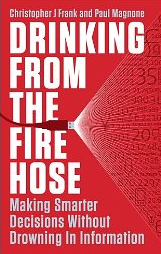 In Prepare for the Worst, Plan for the Best: Disaster Preparedness and Recovery for Small Businesses (page 95), I wrote of the “Info-Stress” phenomenon, of being overwhelmed by the volume of information we must process every day. One technique I recommended was filtering out the irrelevant data to make more productive use of your time. Authors Christopher J. Frank and Paul Mangone give this topic much more thorough treatment in their book Drinking From the Fire Hose: Making Smarter Decisions Without Drowning in Information. I had the pleasure of meeting the authors, who graciously signed my copy of their book, at Business Insider’s Social Media Analytics 2011 conference. The book presents seven “fire hose” questions to help you manage the flow of information, starting with asking yourself “What is the essential question?” to sharpen your focus.
In Prepare for the Worst, Plan for the Best: Disaster Preparedness and Recovery for Small Businesses (page 95), I wrote of the “Info-Stress” phenomenon, of being overwhelmed by the volume of information we must process every day. One technique I recommended was filtering out the irrelevant data to make more productive use of your time. Authors Christopher J. Frank and Paul Mangone give this topic much more thorough treatment in their book Drinking From the Fire Hose: Making Smarter Decisions Without Drowning in Information. I had the pleasure of meeting the authors, who graciously signed my copy of their book, at Business Insider’s Social Media Analytics 2011 conference. The book presents seven “fire hose” questions to help you manage the flow of information, starting with asking yourself “What is the essential question?” to sharpen your focus.
I particularly enjoyed the case study of the online job search business in Germany that had the right solution but ahead of its time. Here the essential question that the business leaders had failed to ask was “How long will it take to change user habits?” and introduce people to new online job tools. My own analogy for that experience is that of short-selling a stock that you (correctly) believe will decline in value. It is not enough to be correct; you have to be correct in the near-term. It can bankrupt you if it takes a long time for you to be proved correct as you will be marking your position with cash daily. Being right in anticipating a new market is not sufficient; you have to be proved correct before you run out of cash. This issue continues to be a challenge for me.
I am working to develop my own business dashboard with the key metrics that I want to track. Determining what to include is relatively easy. Making decisions about what to exclude is much more difficult. That challenge is perfectly captured on the book cover: the fire wire spouting data.



